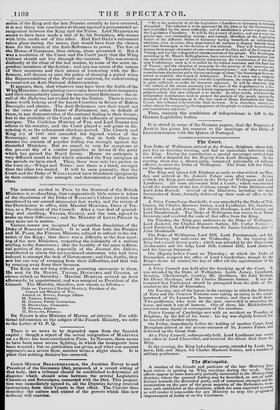Count MUNCH BELLINGRAUSEN, the Austrian Envoy to and President of
the Germanic Diet, proposed, at a recent sitting of that body, that a tribunal should be established to determine all disputes which should arise between the several Legislative Chambers and Sovereigns, connected with the Diet. This proposi- tion was immediately agreed to, all the Deputies having received instructions from their Courts to that effect. The Courier thus describes the nature and extent of the powers which this new tribunal will exercise. "By it the authority of all the Legislative Chambers in Germany is virtually abrogated. The tribunal is to be appointed by the Diet or by the Government, and controlled by the same anthority, and it establishes a power supreme over the Legislative Chambers. It will be like a court of justice, and not a very im. partial one, over contending suitors ; and instead, therefore, of the Legislative bodies of the different States of Germany having henceforth an independent existence, even in name, they must submit all matters in dispute betwixt them and their Sovereigns to the decision of this tribunal. They will henceforward assume their proper character of mere creatures of the Diet, and of the Congress of Vienna, and not the independent representatives of the people. The Sovereigns. according to M. Munch Bellinghausen, have entered into an examination into the most efficient means of ulteriorly maintaining the Constitution of the Ger. man Confederacy, such as it is settled by the federal covenant and the final Act of Vienna ; and the adoption of measures for the security of the sovereign au- thority, which is guaranteed by those fundamental laws ;' and ' after a calm and conscientious discussion and a sincere exchange of ideas,' the Sovereigns have re- solved to establish this Court of Arbitration. Even if it were not a complete usurpation of supreme authority over the Legislatures, the origin of the scheme is quite sufficient to make its character apparent. It will be observed, that 'the refusal of the means necessary (on the part of the Legislature) to a Go- vernment which wishes to fulfil its federal engagements,' is one of the prominent subjects which this new tribunal is to decide. In other words, whenever the independent Legislatures wish to protect the pockets of the people against the demands of the Sovereign, as in the late cases of Hesse Darmstadt and Hesse Cassel, this tribunal is to overrule their decision. It is, therefore, merely an- other scheme for conquering the repugnance of the penple to submit to exorbitant end unnecessary taxation."
Thus, scarcely the semblance of independence is left to the German Legislative bodies.




















 Previous page
Previous page